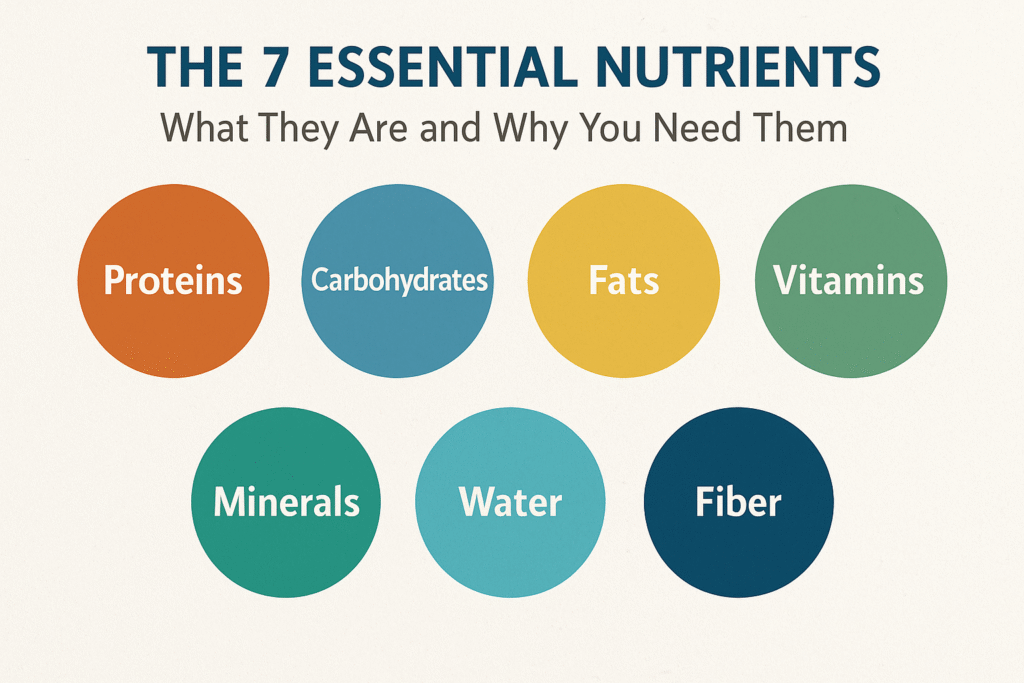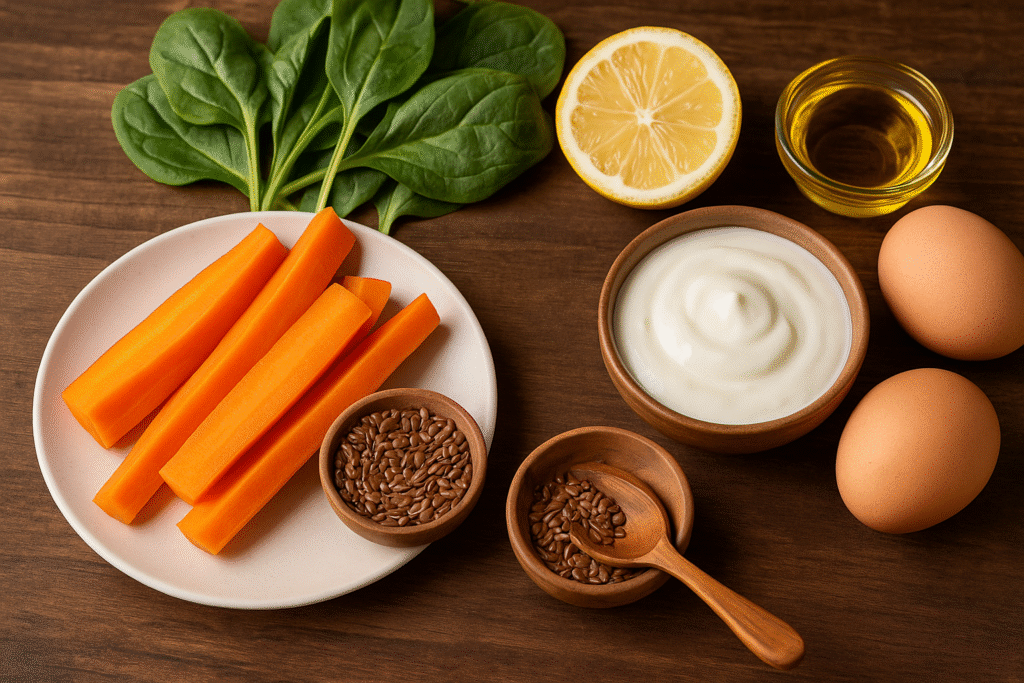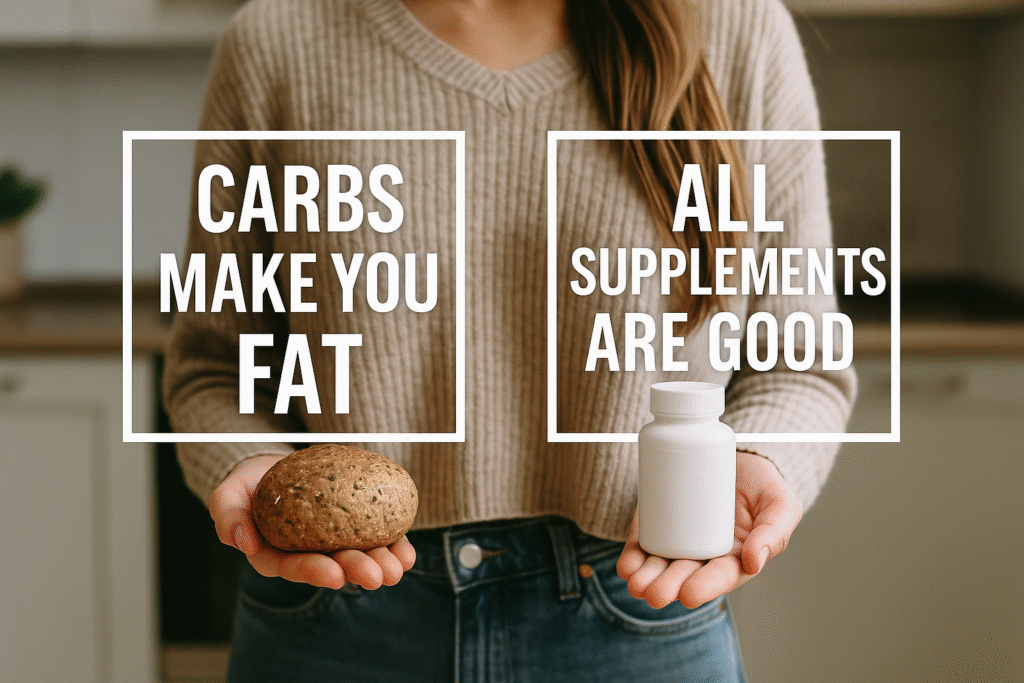In a world filled with fad diets and ever-changing food trends, it’s easy to forget the basics—your body needs a consistent supply of essential nutrients to function properly. Without them, even the healthiest-looking diet can leave you vulnerable to fatigue, poor immunity, and long-term health issues. Essential nutrition isn’t about complexity; it’s about getting the fundamental building blocks that sustain life.
Whether you’re aiming to lose weight, gain energy, or simply feel better each day, understanding these seven core nutrients is the first step toward real, lasting wellness. From the vitamins that power your metabolism to the minerals that support your bones, these nutrients are non-negotiable for your body’s optimal performance.
In this article, we’ll break down each of these essential nutrients, explain why they matter, how much you need, and the best ways to get them from your diet—without overcomplicating your plate. If you’re serious about nourishing your body the right way, this guide is your foundation.
Why Essential Nutrients Matter for Your Health
Nutrients aren’t just fuel—they are the blueprint, the tools, and the maintenance crew your body needs to function, repair, and thrive. Without the right balance of essential nutrients, your health is like a house built on sand—unstable, vulnerable, and at risk of collapse. But what exactly makes a nutrient “essential”?
An essential nutrient is one that the body cannot produce on its own, or not in sufficient amounts. That means you must obtain it through your diet. These nutrients are required for critical functions like cellular regeneration, energy production, immune defense, and mental clarity. Let’s explore why they’re non-negotiable.
🔹 What Does “Essential” Really Mean?
The term “essential” in nutrition is reserved for compounds that your body needs but can’t synthesize by itself. These nutrients must come from external sources—primarily food. Without them, vital processes start to break down. This includes everything from enzyme function and hormone balance to muscle contraction and brain activity.
For instance, you can’t survive without essential amino acids like leucine and lysine. Yet your body doesn’t make them—you must get them through protein-rich foods.
🔹 The Long-Term Effects of Nutrient Deficiencies
Chronic nutrient deficiencies often go unnoticed until symptoms become severe. Fatigue, poor concentration, hair loss, frequent infections, brittle nails, and depression can all be signs your body is missing something fundamental. In the long term, deficiencies may contribute to serious conditions like:
- Osteoporosis (calcium and vitamin D deficiency)
- Anemia (iron and vitamin B12 deficiency)
- Immune dysfunction (zinc and selenium deficiency)
- Neural impairment (omega-3 and choline deficiency)
Why Experts Emphasize Essential Nutrients
“Essential nutrients are not optional. The consequences of neglecting them are often subtle at first, but over time, they manifest as chronic health conditions that are difficult—and expensive—to reverse.” — Dr. Elaine Carter, Clinical Nutritionist
🔹 Quick Comparison: Macronutrients vs. Micronutrients
Let’s clarify the difference. Both are essential, but their roles differ:
📌 Did You Know?Essential Nutrients Span All Categories
Water, often overlooked, is also considered an essential nutrient. Even mild dehydration can impair brain function and metabolism.
The 7 Essential Nutrients: What They Are and Why You Need Them

Your body is an intricate machine that requires specific raw materials to operate optimally. These materials—nutrients—are not interchangeable. Each one serves distinct, life-sustaining roles. While there are dozens of important nutrients, seven are universally recognized as essential. Let’s examine each one and understand what makes them indispensable.
🔹 1. Proteins – The Building Blocks of Life
Protein is essential for the structure and repair of tissues, from muscles and organs to skin and hair. It also supports enzyme and hormone production, immune responses, and cellular repair.
- Key roles: Muscle growth, immune function, enzyme activity
- Sources: Eggs, poultry, legumes, tofu, Greek yogurt
- Recommended intake: ~0.8g/kg body weight (more for athletes)
Proteins are made of amino acids—nine of which are essential. These must be obtained through diet.
💡 Quick Tip
Complete vs. Incomplete Proteins
Animal proteins contain all 9 essential amino acids, while plant proteins may need to be combined (e.g., rice + beans) to achieve a complete profile.
🔹 2. Carbohydrates – The Body’s Main Energy Source
Despite their bad reputation in fad diets, carbohydrates are your body’s preferred fuel—especially for the brain and red blood cells.
- Key roles: Energy production, brain function, metabolism support
- Sources: Whole grains, fruits, vegetables, legumes
- Recommended intake: 45–65% of daily calories
Your Brain Runs on Glucose
The brain consumes nearly 20% of your total energy—mostly from glucose, a carbohydrate byproduct.
🔹 3. Fats – Essential for Hormones and Brain Health
Healthy fats are not just calorie sources; they’re vital for brain function, hormone synthesis, cell membranes, and nutrient absorption (like vitamins A, D, E, and K).
- Key roles: Hormone regulation, brain support, anti-inflammatory balance
- Sources: Avocados, olive oil, nuts, fatty fish
- Recommended intake: 20–35% of daily calories
Why You Shouldn’t Fear Fat
“The key is quality over quantity. Unsaturated fats from whole foods protect your heart and support cognitive longevity.” — Dr. Maya Greene, Integrative Dietitian
🔹 4. Vitamins – Catalysts for Vital Processes
Vitamins are organic compounds your body needs in small amounts to regulate metabolism, immunity, and cellular repair. Deficiencies can lead to serious disease.
- Key roles: Immune strength, wound healing, bone health, vision
- Examples: Vitamin A (vision), B-complex (energy), C (immunity), D (bone strength), E (antioxidant), K (clotting)
- Sources: Vegetables, citrus fruits, dairy, eggs, sunlight (for D)
🔹 5. Minerals – Inorganic But Indispensable
Unlike vitamins, minerals are inorganic but equally essential. They support electrical signaling (like heartbeat), fluid balance, bone formation, and muscle contractions.
- Key roles: Bone structure, oxygen transport, enzyme function
- Examples: Calcium, iron, magnesium, zinc, potassium, selenium
- Sources: Leafy greens, red meat, nuts, whole grains
🔹 6. Water – The Forgotten Nutrient
Water is often overlooked in nutrition but is absolutely essential. Every cell in your body depends on water to transport nutrients, regulate temperature, and eliminate waste.
- Key roles: Hydration, digestion, detoxification, cellular function
- Daily needs: ~3.7 liters (men), ~2.7 liters (women), from all sources
🔹 7. Fiber – Technically a Carb, Functionally a Lifesaver
While fiber is not digested like other nutrients, it plays an essential role in digestive health, blood sugar control, and cholesterol management.
- Key roles: Gut health, satiety, blood sugar balance, heart health
- Sources: Vegetables, fruits, oats, legumes, chia seeds
- Recommended intake: 25g (women), 38g (men)
How to Get These Nutrients from a Balanced Diet
Understanding the essential nutrients is only half the battle—the real challenge lies in applying this knowledge to your daily meals. Fortunately, you don’t need an advanced degree in nutrition or expensive supplements to meet your body’s needs. A strategic, whole-food-based diet can supply all the essentials if you know where to look.
Let’s explore food sources, daily combinations, and smart eating habits that naturally deliver optimal nutrient levels without calorie overload or extreme restrictions.
🔹 Whole Food First: Why Supplements Shouldn’t Be the Default
Supplements have their place—especially for people with deficiencies or restricted diets—but real food contains a symphony of nutrients working in synergy. For example, the vitamin C in an orange aids iron absorption far better than an isolated iron pill.
- Whole foods provide: fiber, phytonutrients, and healthy fats that improve bioavailability.
- Supplements lack: enzymes, cofactors, and the complexity of nature’s design.
Unless medically necessary, focus first on whole, unprocessed foods as your nutritional foundation.
🔹 Diversity is Key: Eating the Rainbow Daily
Each color in fruits and vegetables signifies different nutrients. A colorful plate is the easiest way to ensure broad micronutrient coverage:
- Red foods (tomatoes, berries): lycopene, vitamin C
- Green (spinach, kale): folate, magnesium, vitamin K
- Orange/yellow (carrots, squash): beta-carotene, vitamin A
- Blue/purple (blueberries, beets): anthocyanins, manganese
- White (garlic, onions): sulfur compounds, prebiotics
How to Build a Nutrient-Dense Plate
Divide your plate into ½ vegetables, ¼ lean protein, and ¼ whole grains. Add a healthy fat source (like olive oil or avocado) and water or herbal tea to complete it.
🔹 Smart Pairings to Maximize Absorption

Some nutrients are better absorbed when paired together. These combinations boost bioavailability and nutrient synergy:
📌 Did You Know?
You Might Be Absorbing Less Than You Think
Certain antinutrients in foods—like oxalates in spinach or phytates in legumes—can block nutrient absorption. Soaking, sprouting, or lightly cooking can reduce these effects.
🔹 Essential Nutrients Food Sources Table
What the Research Says About Essential Nutrients and Disease Prevention
Modern science continues to affirm what traditional cultures have known for centuries: what you eat profoundly impacts how you feel, perform, and age. Essential nutrients do more than meet basic physiological needs—they play critical roles in preventing some of today’s most pressing health epidemics, including heart disease, diabetes, cancer, and cognitive decline.
Here’s what the latest research says about how core nutrients protect your health at a cellular level.
🔹 Vitamin D and Immune Health
Vitamin D is not just for bones. It modulates immune responses and reduces inflammation—two key factors in preventing autoimmune diseases and infections.
- A 2021 study in The American Journal of Clinical Nutrition found that individuals with optimal vitamin D levels had over 50% lower risk of respiratory infections.
- The National Institutes of Health (NIH) reports that deficiency in vitamin D is associated with increased susceptibility to infection, particularly in northern climates or during winter months when sun exposure is limited.
Populations with low sun exposure are especially vulnerable, making dietary sources and supplementation crucial.
🔹 Omega-3 Fats and Cardiovascular Protection
Long-chain omega-3 fatty acids (EPA and DHA) reduce systemic inflammation, lower triglycerides, and improve arterial function.
- According to a large meta-analysis published in JAMA Cardiology, omega-3 supplementation significantly reduced risk of heart attacks and coronary death.
- Fatty fish like salmon and sardines remain the best natural sources, but vegan alternatives (algal oil) are available.
✅ Expert Summary
Clinical Impact of Omega-3s
“We now consider EPA and DHA foundational for cardiovascular and neurological health, especially in aging populations.” — Dr. Michael Brenner, Cardiometabolic Specialist
🔹 Magnesium and Type 2 Diabetes
Magnesium is required for over 300 enzymatic reactions, including those involved in blood sugar regulation.
- A 2016 Diabetes Care review reported that magnesium intake is inversely associated with type 2 diabetes risk.
- Magnesium-rich diets improve insulin sensitivity and reduce fasting glucose levels, as supported by recent findings in Healthline’s review of magnesium’s evidence-based benefits.
Foods like spinach, pumpkin seeds, and black beans can naturally boost magnesium levels.
🔹 Folate and Neural Tube Defects
One of the most well-documented nutrient-disease links is folate (vitamin B9) and fetal neural development.
- Women who supplement with folic acid before and during pregnancy reduce the risk of neural tube defects by up to 70%, according to CDC data.
- Leafy greens, lentils, and citrus fruits are rich natural sources.
📌 Did You Know?
Folate vs. Folic Acid
Folate is the natural form found in food. Folic acid is the synthetic form used in supplements and fortified products—both are essential, but absorption differs slightly.
🔹 Zinc and Immune Function
Zinc plays a vital role in maintaining the integrity of immune cells and defending against pathogens.
- A study in BMJ Open concluded that zinc supplementation significantly reduces the duration and severity of common colds.
- Zinc also supports wound healing, taste perception, and DNA synthesis.
💡 Quick Tip
Don’t Overdose on Zinc
Too much zinc (>40mg/day) can impair copper absorption and weaken immune balance. Stick to food sources or moderate-dose supplements unless otherwise advised.
Common Myths About Essential Nutrition That Are Holding You Back
Misinformation is rampant in the health and nutrition space. From TikTok trends to outdated medical advice, many people unknowingly follow guidance that contradicts foundational nutritional science. These myths don’t just mislead—they can cause nutrient deficiencies, metabolic imbalances, and long-term health risks.
Let’s dissect the most common misconceptions about essential nutrition and uncover the truth behind the noise.
🔹 Myth 1: You Don’t Need Carbs If You’re Trying to Lose Weight

This myth has fueled the popularity of extreme low-carb diets. While reducing refined sugars can help with weight management, eliminating all carbohydrates deprives your body of its primary energy source and may impair cognitive function.
- Reality: Whole carbohydrates (like oats, quinoa, legumes) provide fiber, B vitamins, and sustained energy.
- Risk of extreme restriction: Fatigue, hormonal imbalance, and micronutrient deficiencies.
📌 Did You Know?
Your Brain Needs Glucose
The brain consumes about 120 grams of glucose daily—most of which comes from healthy carbohydrate sources.
🔹 Myth 2: You Can Get All the Nutrients You Need from Supplements
Supplements can fill gaps—but they are not replacements for food. Nutrients in whole foods come with co-factors, enzymes, and fibers that enhance absorption and bioavailability—features that isolated supplements lack.
- Example: Vitamin E from almonds is more bioactive than from synthetic capsules.
- Excess risk: Over-supplementation (e.g., vitamin A, iron) can be toxic.
✅ Expert Summary
Supplements vs. Food
“Supplements should support—not replace—a nutrient-dense diet. Whole foods contain thousands of synergistic compounds we haven’t fully studied yet.” — Dr. Carla Nguyen, Nutritional Biochemist
🔹 Myth 3: Fat Makes You Fat
Decades of low-fat marketing led many to believe dietary fat is the enemy. In truth, healthy fats are essential for hormonal balance, brain function, and satiety.
- Good fats: Omega-3s, monounsaturated fats (olive oil, avocado)
- Bad fats: Trans fats (processed snacks, fried foods)
Avoiding fats entirely can lead to dry skin, mood swings, and fat-soluble vitamin deficiencies.
🔹 Myth 4: Only Vegans Are at Risk of Nutrient Deficiency
While plant-based diets require mindful planning, omnivores are not immune to deficiencies—especially in magnesium, fiber, vitamin D, and potassium.
- Omnivores often lack: Fiber, due to low veggie/whole grain intake
- Vegans may lack: B12, iron, zinc—requiring supplements or fortified foods
💡 Quick Tip
No Diet is Automatically Balanced
Regardless of your dietary identity, nutrient gaps can develop without diversity, planning, and education.
🔹 Myth 5: All Calories Are Equal When It Comes to Nutrition
The calorie-in-calorie-out model oversimplifies the body’s complex relationship with food. 100 calories from almonds does not have the same metabolic effect as 100 calories from soda.
- Nutrient-dense calories: Promote satiety, metabolic health, and cellular repair
- Empty calories: Lead to energy spikes/crashes and nutrient dilution
The quality of calories—what they carry in terms of vitamins, minerals, fiber, and fats—matters far more than just the number.
Conclusion
Essential nutrition isn’t a trend—it’s a lifelong foundation for health, vitality, and disease prevention. By understanding the seven core nutrients your body truly needs—proteins, carbohydrates, fats, vitamins, minerals, water, and fiber—you empower yourself to make better choices every single day.
This isn’t about perfection or restriction; it’s about balance, diversity, and respecting what your body needs to function at its best. Whether you’re planning meals for optimal energy, aiming to prevent illness, or simply want to feel better, starting with essential nutrients is the smartest and most science-backed move you can make.
📌 Main Takeaways
- Essential nutrients must come from your diet—your body can’t make them all.
- Protein, carbs, and fats are foundational for energy, repair, and hormonal balance.
- Micronutrients (vitamins and minerals) support immunity, metabolism, and cognition.
- Water and fiber are often overlooked but critical for detox, digestion, and long-term health.
- Whole foods are superior to supplements due to better nutrient synergy and absorption.
- Smart pairings and food diversity improve nutrient uptake and bioavailability.
- Common nutrition myths can sabotage your health—always question and research.
🔗 Further Reading
Ready to Take Your Nutrition to the Next Level?
Quit Sugar for 30 Days: Discover how cutting added sugar transforms your metabolism, energy, and skin in just one month. Read the 30-Day Sugar Detox Plan
How to Eat Carbs Without Gaining Fat: Learn the science of carb timing, glycemic load, and smart pairings to enjoy carbs without storing fat. Master the Art of Carb Control
Mitolyn Review: Could this mitochondria-boosting supplement be the missing piece in your energy and longevity strategy? Read the Expert Review on Mitolyn




There is depth in your reflections, but never heaviness. The writing feels like clear water in a still pond, inviting the reader to gaze deeper, to see themselves and the world mirrored with honesty and grace.